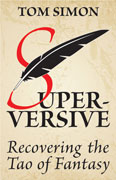My essai for the first anniversary of L. Jagi Lamplighter’s Superversive blog is now up in full:
Part One: What’s so special about carbon?
Part Two: What’s so special about the Tao?
Reposted on SuperversiveSF in one piece.
Go, read, and I hope you enjoy.
In other news, I shall not be writing this week, as I have finally enlisted some help to do a top-to-bottom cleaning of my flat, which is many months overdue. The accumulation of books and papers was making it impossible for me to hoover up the dust, and the dust was making it difficult to do anything else. I have been living largely on a diet of antihistamines and facial tissue. Enough of that!









Recent Comments